There is nothing more adorable than baby guinea pigs. If you thought adult guinea pigs were adorable, just wait to see their babies! Their babies are much smaller and cuter! These adorable little babies are called pups and are born after more or less 2 months of pregnancy.
But for soon-to-be guinea pig owners, have you ever wondered what do baby guinea pigs eat?
What to feed baby guinea pigs? Baby guinea pigs feed with their mother’s milk for the first 3 weeks. After that, you can feed them alfalfa pellets and alfalfa hay that are essential for their proper growth. Additionally, feed them with timothy hay that will serve as a major baby guinea pig’s diet. Lastly, give them fresh produce (veggies and fruits) rich in vitamin C.
Caring for young pups shouldn’t be hard if you have the right information for their diet. Of course, many of the rules for the grown guinea pigs apply here.
In all sections below, we will cover the most common foods for the pups, why they are good for them, unhealthy foods for pups, and more! So keep reading!
Table of Content
What to Feed the Pups Right After They Are Born?
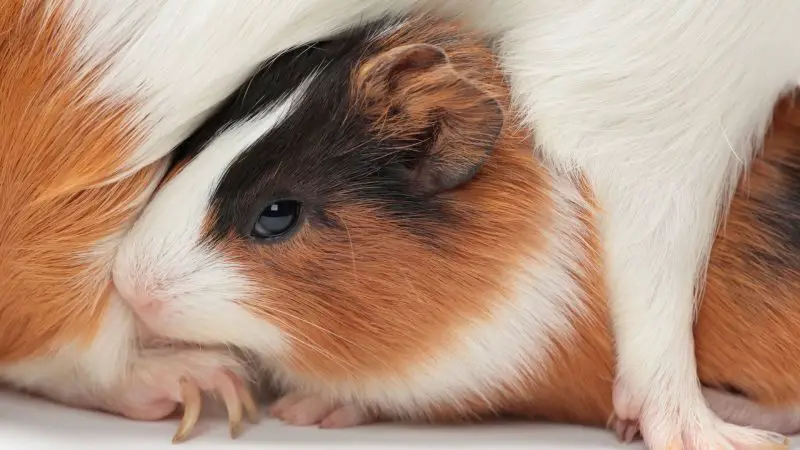
When the pups are newborns, don’t feed them anything at first, they only need their mom’s milk. They can be nursed for up to 6 weeks after they are born, but usually, the mom nurses them for around 3 – 4 weeks.
So, put a greater focus on the mother’s healthy diet during that period! The guinea pig mother must eat healthily and well all the time to be able to breastfeed her small baby guinea pigs with enough healthy milk.
After the nursing weeks have passed, the baby guinea pigs can be slowly introduced to dry foods, such as grass or alfalfa hay.
Why Alfalfa Hay?
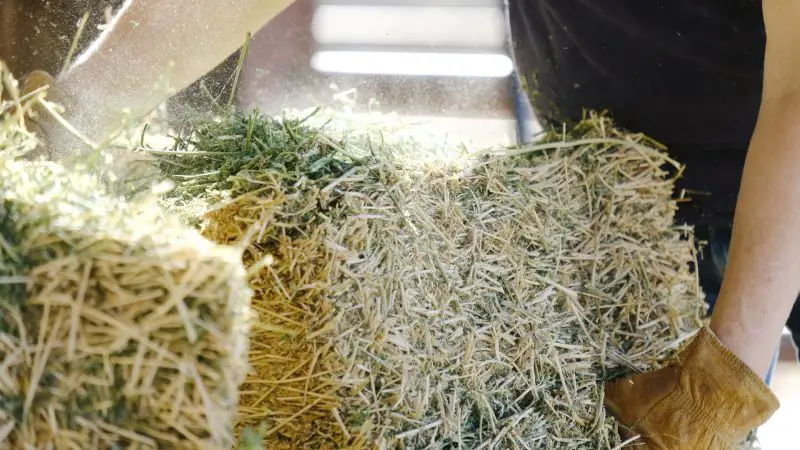
Alfalfa hay is full of minerals and vitamins that baby guinea pigs need. It smells delicious too, so it won’t be a problem to make the baby cavies eat it. However, alfalfa hay has some nutrients in excess.
For example, it has a lot of calories which can lead to obesity or at least weight changes. But, since the babies of guinea pigs need good and nutritious foods, they can consume the alfalfa hay after the breastfeeding period, so don’t worry too much about their weight when they are young.
If you feed them alfalfa quite often, at least avoid the veggies and fruits that have a lot of calcium in order to create a balanced diet.
Alfalfa hay contains calcium, and the pups will benefit from this, but make sure to create a variety in their diet after they pass the breastfeeding stage.
Why Alfalfa Pellets?
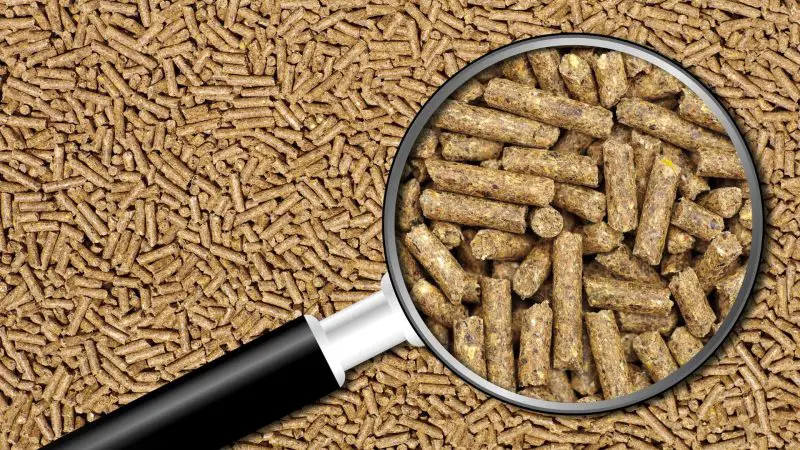
These pellets are good for guinea pig pups because they contain many vitamins and minerals. Just make sure not to make the mistake of giving the guinea pig babies the pellets made for hamsters, rabbits, or similar small animals.
There is a reason why every food is made, especially for guinea pigs and not other animals. Guinea pig babies (and adults) need vitamin C, the pellets made especially for them contain this vitamin in good amounts.
Why Timothy Hay?
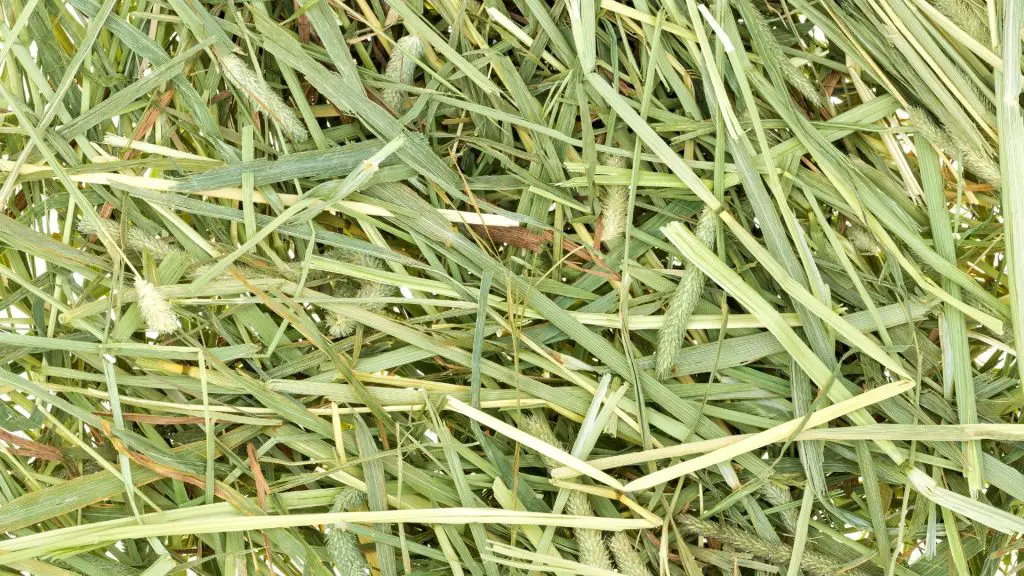
Timothy hay contains less calcium than alfalfa and a bit less protein. Usually, the guinea pig babies need all the calories, calcium, vitamins, and minerals they can get (once the breastfeeding stage is over).
And, if the guinea pig babies are a bit too chubby, keep it in mind that timothy hay is less caloric than alfalfa hay.
How Much Hay Can the Guinea Pig Babies Consume?
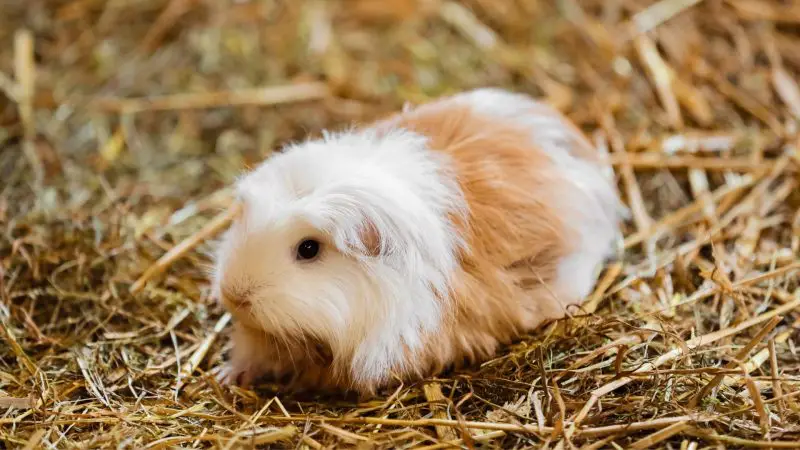
The grown guinea pigs must eat hay every single day, and the serving size a day must be ‘the size of their own body’! This means the babies should eat less than adult guinea pigs.
Also, always keep an eye on the mother guinea pig because if she doesn’t get enough good food, she will not be able to breastfeed (well).
Fresh Produce
Baby guinea pigs will have formed teeth around 2 weeks of age. Don’t be surprised by this, and know that they can consume most foods by the time they are done nursing.
However, the guinea pig pups will not quite ‘understand’ solid foods like produce right away. Still, the best foods for guinea pig babies that are a bit more grown are a fresh produce with lower amounts of sugars or calcium (once the pups grow up a little bit). Use our diet lists to see what foods guinea pigs can eat.
What Nutrients Are Most Needed to the Guinea Pig Babies?
The baby guinea pigs must receive enough vitamin C and calcium. Vitamin C is needed for scurvy prevention. Scurvy is a disease that occurs with a deficit of vitamin C and manifests with: rough coat, loss of appetite, fatigue, diarrhea, and weight loss.
Meanwhile, calcium is needed by the young guinea pig pups to form strong and healthy bones. Overall, they must receive their mother’s milk, after that, some pellets and hay, vitamin C foods, and calcium.
What Foods Are Bad for Them and How Long Does the Nursing Last?
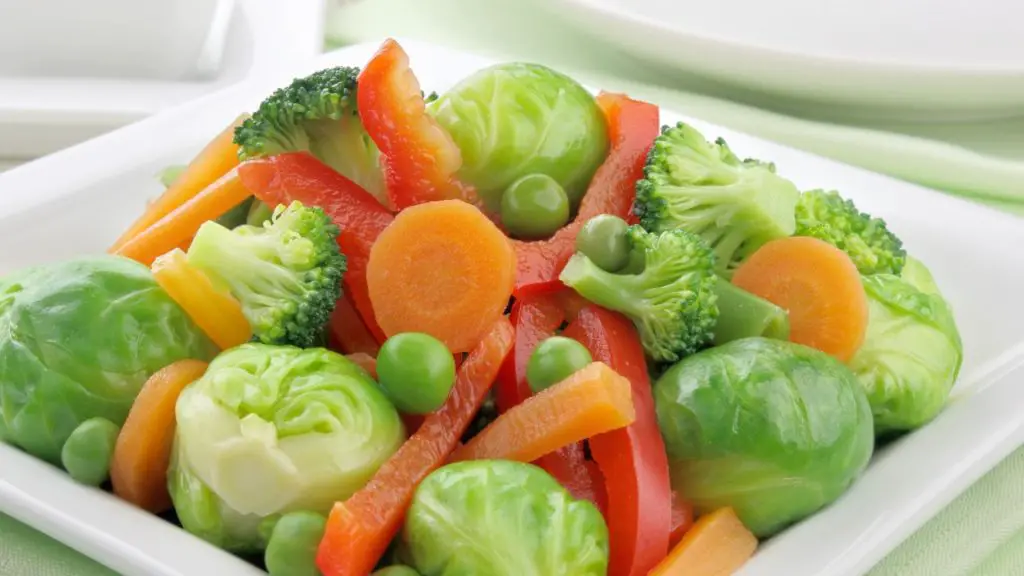
The guinea pigs cannot consume all the tasty foods that humans eat. This means no cooked foods, no desserts, no processed foods, or anything similar. Next time you snack on chips, don’t give them to the guinea pig babies or their parents.
Their digestive systems are made for vegetarian foods, uncooked, raw – as found in nature mostly. See our list to see what foods are toxic and bad for guinea pigs.
Breastfeeding of guinea pigs lasts for 3 weeks; it is normal for the pups to follow their mom everywhere she goes. They will even copy her behavior, so some pups can even figure out how to drink water from the water bottle.
Also, some pups will start nibbling hay, grass, or pellets once they see their mom doing that.
30 Amazing Facts About Guinea Pig Babies You Need to Know
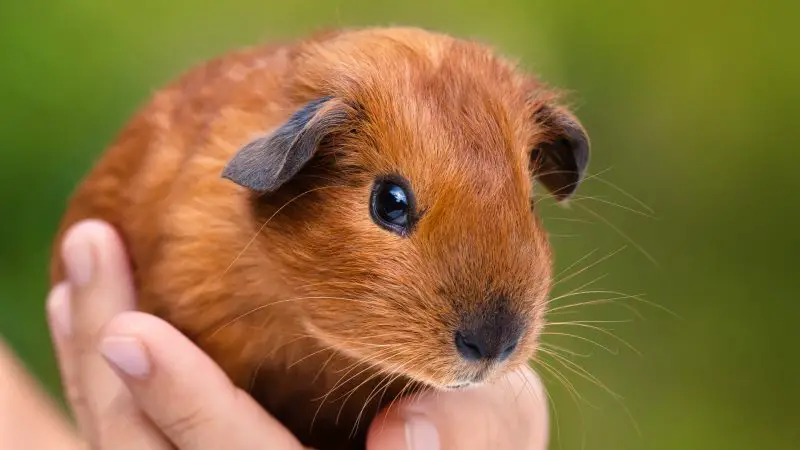
1. The guinea pig babies are called ‘pups’.
2. Pups should not leave their mom for at least 3 weeks after they are born.
3. The mother is breastfeeding the pups for a minimum of 3 weeks and a maximum of 6 weeks.
4. When purchasing a pup, make sure that it is at least 3 weeks old, or the best-case scenario is 1 or 1.5 months old.
5. If you decide to ‘adopt’ a pup, make sure to buy him an ‘igloo’ before you bring the little cutie home. This toy makes them feel safe and sheltered. And it is normal for them to want this if they are getting separated from family members and moving into a new home!
6. You must never hover above the little guinea pig pup unless it feels safe and gets adjusted to you. You should never do this because you may appear like a huge predator!
7. If you want to build great trust with the guinea pig baby, make sure always to offer him food and treats in a very gentle way. No sudden movements, no loud sounds, or similar things!
8. Don’t ever pull the little guinea pig baby from its igloo or shelter place. It will probably make a shrieking sound, and this is not good! Don’t scare the little guinea pig, and let it learn the new environment by itself.
9. If you want to attract the baby guinea pig to come closer to you or come out of the igloo, place a treat or food in front of the igloo. Over time, you can place the food further from the igloo entrance.
10. The baby guinea pigs need a lot of calcium in the first few weeks after they are born! As often mentioned, calcium is not good for grown-up cavies, but little guinea pig babies need this to grow into healthy guinea pigs.
11. For extra calcium, provide them with alfalfa pellets and alfalfa hay.
12. The majority of the diet for guinea pig babies that are no longer nursing should be vitamin C foods. This vitamin is essential for being healthy, surviving, and fighting scurvy.
13. The guinea pig babies must be fed at least twice daily.
14. For bedding of the cage, use timothy hay. You want to make the little baby guinea pigs feel as comfy as possible. Also, this same bedding is used as food too.
15. Always change the bedding regularly. If bedding is not changed regularly, the guinea pig babies will be prone to illnesses or infections as they go to the bathroom in the corner of the cage! The best frequency for changing the bedding is 2 times weekly.
16. Do not use other types of hay as bedding; just use timothy hay. The other types may be perfumed or harmful for the baby guinea pig.
17. Use around 2 inches of timothy hay as bedding, never less! The little guinea pigs might get chilly and will want to curl up in hay when they sleep.
18. Do not groom the baby guinea pig if it’s too young. Don’t bathe them! At least wait until they are old enough.
19. When the mother guinea pig is not available, you can mash some pellets or use special ‘recovery food’ in the form of nutritional supplements or powders recommended by the vet. If the baby guinea pig has been without his mother since the very birth, then feed him every few hours and follow the instructions given by the vet.
20. Did you know that the guinea pig babies come to this world with already formed teeth?!
21. When you hand-feed the baby guinea pigs, do it with clean hands. They will adjust to your smell and will not be repulsed by perfumes or lotions on the skin. So, remember to have clean hands and gentle movements!
22. If the baby guinea pigs are very young, examine their cage carefully before putting them inside. Many cages are designed for adult cavies and not so much for pups! For example, the water bottle might not be well-placed. Or, the cage bars could be too far apart from one another.
23. Baby guinea pigs are born with fully opened eyes.
24. The guinea pig babies become mature and sexually active in a short period, after just 3 weeks! This is why you must separate them when they are younger than 4 weeks, to avoid pregnancy.
25. The baby guinea pigs can ‘meet their father’ only when mom isn’t around! Also, make sure that the babies are younger than 3 weeks old, because the father could make them pregnant once they are sexually mature!
26. If you touch a baby hamster, the mother will eat it! But if you touch a baby guinea pig, the mother will not reject it. However, it will be more cautious around the baby guinea pig. Other rodents eat their pups, but not guinea pigs.
27. Usually, the mother gives birth to 3 pups at once.
28. The mother always cleans the guinea pig babies herself.
29. Baby guinea pigs are born with full fur and coat!
30. As a rule, the female baby guinea pigs should stay next to their mother until they are 4 weeks old. The male ones can stay until they are 3 weeks old.
Related: 50 Amazing Guinea Pig Facts You Need To Know
